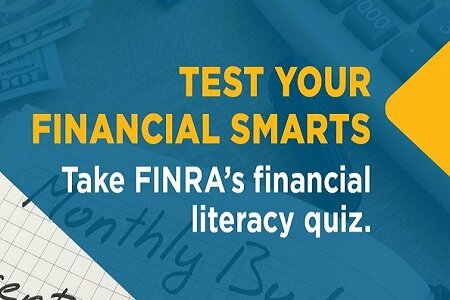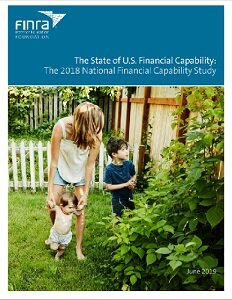How Would You Rate Your Financial Know-How?
If someone asked you to rate your financial know-how on a scale of 1-7 (with 7 being the highest) where would you place yourself?

If you are like the Americans who participated in the 2018 Financial Investor Regulatory Authority (FINRA) National Financial Capability Study (NFCS), you would probably give yourself a pretty high score.
In that study, 76% of respondents placed themselves in the 5-7 range. The reality is that only 34% of those who participated could correctly answer at least four of five basic financial literacy questions on topics such as mortgages, interest rates, inflation and risk.
Curious about your own answers? Here’s your chance.
Click on this link at the bottom of this post to take the Financial Literacy Quiz. It not only gives you an immediate score, it shows you how you compare to others in your state.
Whether the quiz confirms your knowledge or serves as a personal wake-up call, the generally low results of the NFCS definitely demonstrate the need to improve financial literacy in our country. The good news is that there’s tangible proof that financial education works.
- According to the 2018 NFCS, nearly half of Americans (49%) who have received more than ten hours of financial education report spending less than they earn, compared with 36% of people who received less than ten hours of financial education.

- Research from the 2020 Council of Economic Education Survey of the States shows that students who receive financial education borrow more sensibly, from student and personal loans to credit cards.
- Results from the PISA assessment show that young people and adults in both developed and emerging economies who have been exposed to high quality financial education are more likely than others to plan ahead, save and engage in other responsible financial behaviors.
The good news is that whether you are a parent, a teacher, an employer or a concerned member of your community, there are things you can do to help promote financial education for everyone in your community.
- The Global Financial Literacy Center offers FastLane, with practical ideas and action plans for groups and individuals.
- On CheckYourSchool.org, you can find the schools in your area that offer financial education and the ways you can start/reinforce local financial literacy programs.
- DonorsChoose offers lesson plans and activities for educators that have been created by teachers in the field, for teachers. There are also opportunities to find school programs in your own community that you can support.
At the end of the day, there is a growing global awareness that financial literacy is an essential life skill that means not only greater prosperity, but better choices, increased confidence, and the ability to more successfully handle real-life financial challenges.
Financial literacy isn’t just about math. It is about attaining the knowledge and skills to confidently manage our everyday financial lives and the need for financial education, which is greater than ever locally, nationally, and globally
TAKE THE FINANCIAL LITERACY QUIZ
Parts of this blog were excerpted from an onlne post by Carrie Schwab-Pomerantz,CFP®, Board Chair and President, Charles Schwab Foundation; Senior Vice President, Schwab Community Services, Charles Schwab & Co., Inc.; Board Chair, Schwab Charitable